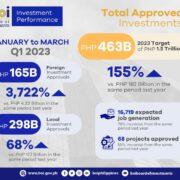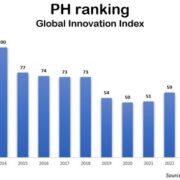
The Philippine Board of Investments (BOI) continues to push forward at full throttle to attract more investments into the country and hit its Php1.5 trillion annual target as investment approvals rise by 155 percent, with foreign investment approvals soaring even higher by 3,722 percent toward the end of first quarter 2023 .
Department of Trade and Industry (DTI) Secretary Fred Pascual boasted that the Philippine economy continues to perform strongly, with the country’s gross domestic product (GDP) expected to grow by 7.1 percent in the first quarter as latest data on employment and national government spending shows positive signals, making the Philippines one of the fastest-growing economies in the Asia-Pacific. “The steady growth is proof of the government’s resolve to further improve the country’s business environment through investment-friendly policies. We shall continue with our aggressive investment promotion campaigns as investments are also set to provide higher quality and better-paying jobs for Filipinos,” Secretary Pascual said.
“With investment prospects being very positive, and as we continue to receive serious interest from global investors, we are definitely on track to meeting our new annual investment target of Php1.5 trillion,” Secretary Pascual added.
For the first three months of the year, total investment projects approved by the lead investment promotion agency reached Php 463.3 billion based on latest BOI figures, surging by 155 percent compared to the same period last year when it recorded Php 181.7 billion.
Secretary Pascual also noted that BOI foreign investment approvals performed even better, accelerating to Php165.4 billion in the same period, a remarkable 3,722 percent growth from just Php4.33 billion in the same quarter in 2022. It accounted for nearly 36 percent of the aggregate total with domestic investment nods taking up the rest with Php297.9 billion, a 68 percent rise from Php177.3 billion last year.
Based on first quarter BOI figures, the bulk of foreign capital came from Germany with Php157 billion followed by the Netherlands (Php2.7 billion), the United States (Php1.2 billion), Japan (Php524 million), and the United Kingdom (Php 293 million).
In terms of regional dispersion, investments in Western Visayas led the way with Php293.3 billion, while CALABARZON took up second place with Php112.7 billion. This is followed by Ilocos Region (Php38.7 billion), Davao Region (Php3.6 billion), and Eastern Visayas Region (Php3.6 billion), completing the top five regions.
Further, the renewable energy/power sector remains dominant with Php440 billion in approvals to date, this is 156 percent higher than the same period last year with Php172 billion. Manufacturing is also on the upswing with Php17 billion in approvals, 416 percent higher from just Php3.3 billion in the same period last year. Administrative services (Php3.7 billion), transportation and storage (Php1.2 billion) and agriculture (Php929 million) also make up the biggest sectors.
Among the top projects approved for January to March 2023 is German-owned wpd Philippines, Inc.’s Php392.4 billion offshore wind farms located in Cavite, Negros Occidental, and Guimaras, which will provide greener power solutions to local communities and businesses. Filipino-owned 3 Barracuda Energy Corp. comes in second place with its Php36.9 billion solar energy project located in the Ilocos Region.
“The number of RE projects coming in is concrete evidence that we are on our way to becoming a global hub for sustainability and green projects, aligned with the national government’s policy of promoting cleaner and more sustainable sources of energy. We aim to attract more RE players globally as full foreign ownership is now allowed under the amended implementing rules and regulations of the Renewable Energy Act,” Secretary Pascual concluded.






